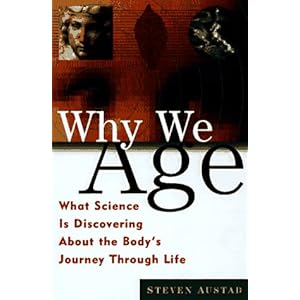Why We Age : What Science Is Discovering about the Body's Journey Through Life
by Steven N. Austad
John Wiley & Sons; (May 9, 1997) ISBN: 0471148032
"...for an interesting rebuttal of the telomerase anti-aging hypothesis, see Stephen Austad, Why We Age : What Science Is Discovering about the Body's Journey Through Life. Excellent book, on all kinds of fronts, including its skepticism on anti-aging therapies." - Michael Rae
Amazon editor notes:
Before we know why we age, we need to know how we age. According to Steven Austad, we should blame the process on rusting and cooking. Oxygen causes our cells to rust, and glucose causes some of our tissues to take on the qualities of cooked meat. If we eat less food, we cook more slowly and we live longer. So, why do we age? Austad claims that we've evolved to have a certain reproductive usefulness, and after that the species doesn't need us anymore. What about all the "antiaging" equations modern science promises? Generally, the best they can do is prevent premature death. Sound harsh? Well, that's life, and Why We Age is one of the most entertaining and comprehensive guides on aging that you'll find.
Book Description:
Why has the lifespan of the average American increased from 48 to 75 years in this century alone?
Is the body a machine that simply wears out? If so, why do some cells seem immortal?
What can we learn from the fact that different animals age at different rates?
Will we find a gene for aging? Will we be able to control it?
Is there any basis to the claims being made for melatonin and DHEA as antiaging drugs?
Aging has long occupied a central position in the collective human consciousness. Now, in this eye-opening new book, biologist Steven Austad investigates the history, the theories, and the personalities behind the quest to understand it. In Why We Age, he offers real evidence from the front lines of research that science is finally closing in on its fundamental processes.
A leading expert on aging, Dr. Austad clears away the clutter of exaggeration and folklore to present a full picture of the new understanding of what aging is, why it happens, andmost provocativelywhether it can be controlled. Drawing on the latest developments in such fields as evolutionary biology, comparative zoology, anthropology, and basic medical research, Austad surveys and synthesizes an enormous amount of material. He explores the basic concept of longevity and the various ways we measure it, and analyzes the claims of greatly extended lifetimesas well as our eagerness to believe them. In anecdotes that read like detective stories, Austad tracks down outrageous examples of age inflation from around the world and throughout history, from the celebrated seventeenth-century case of Thomas Parr, who was buried with great honor in Westminster Abbey for his false claim of having lived more than 150 years, to intriguing tales from Pakistan, the Caucasus, and Ecuador.
As he describes the different responses of neurologists, cardiologists, and evolutionary and cell biologists to key questions on the causes of aging, Austad paints illuminating portraits of such renowned scientists as J. B. S. Haldane and Peter Medawar, both major contributors to our understanding of why we age. We learn how long-term exposure to certain hormones, especially estrogen and testosterone, affects longevity, and how new therapies made possible through advances in molecular biology offer hope for slowing aging and extending life.
A fascinating testament to the dawning of a new era in science, Why We Age, like all the best science writing, offers a new and profound understanding of life itself.
"I hope to convey some of the colorful history of the field, the parade of ideas, the outsized personalities, the key experiments and experimenters, as well as our current excitement and the reasons for it. . . . I would hope that both the lay and professional reader might learn to think about aging without terror or tears, to think about it as an intriguing puzzle rather than a gloomy inevitability."from the Preface

